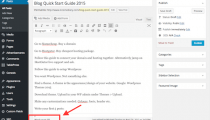
The Best Keyword Research Tools For More Search Traffic
Are you struggling to find the right keywords to drive more traffic to your website? Or are you tired of using the same generic keyword research tools as everyone else? If so, you’re in luck! In this article, we’ll introduce you to 15 of the best keyword research tools that can help you uncover untapped search traffic opportunities.
These tools are perfect for finding long-tail keywords, analyzing your competitors’ websites, and understanding the intent behind your target audience’s search queries. By using these niche keyword research resources, you can give your website a competitive edge and attract more targeted traffic to your pages. So, buckle up and get ready to take your keyword research game to the next level!
Niche Keyword Research Process and Guides
What is Keyword Research
Keyword research is the process of analyzing and identifying the words and phrases that people use to search for information, products, or services online.
It is a critical part of search engine optimization (SEO) as it helps you understand your target audience’s search behavior and the terms they use to find content related to your website. By conducting keyword research, you can identify the most relevant and high-volume keywords for your business and optimize your website’s content accordingly to improve its visibility and rank higher in search engine results pages.
How to Do Keyword Research
When it comes to keyword research, there are several approaches you can take. Here are some of the best ways to do keyword research:
1. Use Google’s Keyword Planner: This is a free tool that allows you to research keywords and get insights into their search volume, competition, and potential cost per click.
2. Analyze Your Competitors’ Websites: Look at the keywords your competitors are targeting and see if there are any gaps you can fill.
3. Use Long-Tail Keywords: Long-tail keywords are longer and more specific phrases that can help you target a more niche audience. They also tend to have less competition.
4. Use Keyword Research Tools: There are many paid and free keyword research tools available that can help you identify new keywords and analyze their potential.
5. Consider User Intent: It’s important to understand the intent behind your target audience’s search queries. Are they looking for information, products, or services? By understanding their intent, you can create content that better meets their needs.
By using a combination of these approaches, you can develop a comprehensive keyword research strategy that helps you attract more targeted traffic to your website.
How to Choose Profitable Keywords
Choosing profitable keywords for SEO involves finding relevant and high-volume keywords that are likely to attract potential customers to your website.
How to choose profitable keywords:
1. Identify your target audience: Understand your target audience and their search behavior to determine the keywords they use to search for your products or services.
2. Research your competitors: Analyze your competitors’ websites and the keywords they are targeting to identify gaps and opportunities for your business.
3. Use keyword research tools: Use keyword research tools like Google Keyword Planner, SEMrush, Ahrefs, and Moz to identify relevant keywords and their search volume.
4. Analyze keyword intent: Consider the intent behind the keywords you choose. Are they transactional (i.e., related to making a purchase), informational (i.e., related to seeking information), or navigational (i.e., related to finding a specific website)?
5. Focus on long-tail keywords: Long-tail keywords are more specific and have less competition, making them easier to rank for and more likely to attract potential customers.
6. Optimize your website content: Once you have identified profitable keywords, optimize your website content by including them in your page titles, headings, meta descriptions, and body content.
Remember that choosing profitable keywords is an ongoing process that requires continuous analysis and optimization to ensure that your website remains visible and competitive in search engine results pages.
How to Optimize a Webpage for a Keyword
Here are some of the best practices you can follow to optimize your webpage for a specific keyword:
1. Choose a Primary Keyword: Identify the primary keyword you want your webpage to rank for. Make sure the keyword is relevant to the content of your webpage and has a decent search volume.
2. Include the Keyword in the Title Tag: The title tag is one of the most important on-page SEO elements. Include your primary keyword in the title tag to help search engines understand what your webpage is about.
3. Use the Keyword in the URL: Include your primary keyword in the URL of your webpage to help search engines and users understand what the webpage is about.
4. Use the Keyword in the Content: Include your primary keyword in the content of your webpage. However, make sure you don’t stuff the keyword unnaturally into the content. Write high-quality, informative content that naturally includes the keyword.
5. Use Header Tags: Use header tags (H1, H2, H3, etc.) to organize your content and include the primary keyword in at least one of the header tags.
6. Optimize Images: Use descriptive, keyword-rich filenames and alt text for images on the webpage.
7. Improve Page Speed: Optimize your webpage to load quickly. Page speed is one of the ranking factors for search engines.
By following these best practices, you can optimize your webpage for a specific keyword and improve its chances of ranking higher in search engine results pages.
How to use Frase to generate keyword ideas
Frase.io is a powerful content marketing and SEO tool that can help you generate keyword ideas and optimize your content for better search engine rankings. Here are some of the benefits of using Frase.io for keyword research:
1. Content optimization: Frase.io can help you optimize your content for specific keywords by analyzing your content and suggesting changes that will improve its relevance to those keywords. This can help improve your search engine rankings and drive more traffic to your website.
2. Topic research: Frase.io can help you identify popular topics in your industry or niche that you can target with your content. This can help you create content that is more likely to be shared and linked to, which can improve your search engine rankings and drive more traffic to your website.
3. Competitive analysis: Frase.io can help you analyze your competitors’ content and identify keywords that they are targeting. This can help you identify gaps in your own content and find new opportunities to target keywords that your competitors may not be targeting.
4. Content creation: Frase.io offers a suite of content creation tools that can help you create high-quality content that is optimized for specific keywords. This can save you time and resources by streamlining your content creation process.
Overall, Frase.io is a powerful tool that can help you generate keyword ideas, optimize your content, and improve your search engine rankings. Whether you are just starting out with SEO or looking to take your content marketing to the next level, Frase.io can help you achieve your goals.
Do you Make these 13 Keyword Research Mistakes?
Resource in Question: Leaving Work Behind
Simply put, things to look out for.
Many of the mistakes in this article are very easy to make.
For Example: Relying on Broad and Phrase Match searches do not give you an accurate estimate of search on a given term. When using Exact, you’ll get a much more accurate (albeit maybe less impressive) list of results.
Avoid these mistakes to create accurate and effective keyword lists that will make you money.
Keywords Forensics: Research Search Terms That Others Miss
Resource in Question: Search Engine Watch
John Alexander of Search Engine Academy explains Keyword Forensics as a way to survey keyphrases as they have been input by users in an attempt to identify a user behavior, then create very specific content on your site to serve these needs.
For Example: Words like Review, Study, Statistics, Rare, Find, Discount, Wholesale, Pattern, Maps, Supply, Supplies, Old, New, Pricing, and Recipe reveal a buying intent in some way or another.
The idea is using the searchers intent, you can position yourself as an authority in the context of what they’re looking for, and stand a much better chance of converting cold traffic into sales.
How to Find Content Topics That Score Big Using Keyword Research
Resource in Question: Copyblogger
After finding your keywords, at some point you’re going to have to create content, no way around that.
This article from Copyblogger shows you how to use Alternative Keywords to create content that reaches new audiences. Then it gives you a couple of ideas for contacting other websites that could link to your content.
After all, if nobody is seeing what you write, it kind of defeats the purpose, right?
Ways to Brainstorm Keyword Ideas (And Jumpstart your Brain)
There are several ways to brainstorm keyword ideas for your website.
One effective method is to start by thinking about your business, industry, and the products or services you offer. You can then use tools like Google Keyword Planner, SEMrush, and Ahrefs to research related keywords and phrases that people are searching for online.
Additionally, you can ask your customers and followers for input on what terms they use when searching for your products or services.
Another helpful approach is to analyze your competitors’ websites and see what keywords they are targeting. This can give you ideas for keywords that you may have overlooked. Finally, it’s important to regularly review and update your keyword strategy to ensure that you are targeting the most relevant and effective keywords for your business.
Using social media to generate keyword ideas
Social media can be a great source of keyword ideas for your website. One way to use social media for this purpose is to monitor the conversations that your target audience is having. Look for common phrases, questions, and topics related to your business or industry. This can give you insight into the language your audience uses and the keywords they may be searching for.
Another way to use social media is to check out the hashtags that are relevant to your industry or niche. Hashtags can help you discover trending topics and popular keywords that you can use in your content.
Additionally, you can analyze the social media profiles of your competitors and see what keywords they are using in their posts and profiles. This can give you ideas for keywords that you may want to target as well. Overall, social media can be a valuable tool for generating keyword ideas and staying up-to-date on the latest trends in your industry.
Keyword Research Can Help Make You Money
Resource in Question: Copyblogger
This is where we start to get into the real juicy stuff. Once you’ve been discovering what people are going to be searching for, and you’re creating content that corner’s the market in your area, it’s time to make some money.
Copyblogger hones in on doing keyword research for product reviews that you can use affiliate links to sell stuff on your blog, and make a commission.
Keyword Research Tools
Below is a list of free keyword research tools that will give you insight into search volume, competition, and ranking difficulty.
With each tool listed below, you’ll find 3 things.
- A link to the tool
- A link to the best free tutorial
- The length of the tutorial in (mm:ss)
Using SEMrush for keyword research
Semrush is a powerful tool for keyword research that provides a wealth of information to help you identify the best keywords to use in your website content. Here are some benefits of using Semrush for keyword research:
1. Comprehensive keyword database: Semrush has a vast database of keywords, including long-tail keywords, that can help you find the most relevant keywords for your content.
2. Competitive analysis: Semrush allows you to analyze your competitors’ websites and identify the keywords they are using to rank high in search engine results. This analysis can help you discover new keyword opportunities and refine your keyword strategy.
3. Keyword difficulty analysis: Semrush provides a keyword difficulty score that helps you determine the level of competition for a given keyword. This analysis can help you identify low-competition keywords that are easier to rank for.
4. Search volume and trends: Semrush provides data on search volume and trends for each keyword, which can help you identify the most popular keywords in your industry.
5. Content analysis: Semrush can analyze your website content and suggest keywords that are relevant to your content. This analysis can help you optimize your content for search engines and improve your search engine rankings.
Overall, Semrush is a powerful tool that can help you identify the best keywords to use in your website content and improve your search engine rankings.
Frase keyword research tool
Frase.io is an AI-powered tool that can help you conduct keyword research more efficiently and effectively. It allows you to analyze your website and your competitors’ websites to identify gaps in your content and find new keyword opportunities.
Additionally, Frase provides you with data on search volume, competition, and user intent, which can help you make more informed decisions about which keywords to target.
With Frase.io, you can also generate content briefs and optimize your content for multiple keywords at once, saving you time and effort. Overall, Frase.io is a powerful tool that can help you improve your website’s search engine visibility and attract more traffic from your target audience.
Using Google Trends For Keyword Research
Google Trends is a useful tool for keyword research. It allows you to explore the popularity of specific keywords over time and in different geographic locations. Here are the steps to use Google Trends for keyword research:
1. Go to Google Trends: Go to the Google Trends website (https://trends.google.com/trends/).
2. Enter your keyword: Enter the keyword you want to research in the search box.
3. Select your filters: Use the filters at the top of the page to refine your search by location, time range, and category.
4. Explore the results: Google Trends will show you a graph of the keyword’s popularity over time and related topics and queries. You can also see the interest by region and related searches.
5. Compare keywords: You can compare the popularity of multiple keywords by entering them in the search box and clicking “Compare.”
6. Use the insights: Use the insights from Google Trends to inform your keyword strategy. For example, you can identify seasonal trends in search volume or compare the popularity of different variations of a keyword.
Remember that Google Trends provides relative, not absolute, search volumes. So, it’s best to use it in conjunction with other keyword research tools.
Spyfu
SpyFu is a powerful tool for keyword research that provides a wealth of information to help you identify the best keywords to use in your website content. Here are some benefits of using SpyFu for keyword research:
1. Comprehensive keyword database: SpyFu has a vast database of keywords that can help you find the most relevant keywords for your content. It also includes long-tail keywords that you might have missed otherwise.
2. Competitive analysis: SpyFu allows you to analyze your competitors’ websites and identify the keywords they are using to rank high in search engine results. This analysis can help you discover new keyword opportunities and refine your keyword strategy.
3. Keyword difficulty analysis: SpyFu provides a keyword difficulty score that helps you determine the level of competition for a given keyword. This analysis can help you identify low-competition keywords that are easier to rank for.
4. Search volume and trends: SpyFu provides data on search volume and trends for each keyword, which can help you identify the most popular keywords in your industry.
5. Advertiser history: SpyFu also provides data on the history of ads and keywords used by your competitors. This analysis can help you understand the strategies used by your competitors, and accordingly plan your keyword strategy.
Overall, SpyFu is a powerful tool that can help you identify the best keywords to use in your website content and improve your search engine rankings.
There you have it
15 Resources to get you on the right track, find a profitable niche, or at the very least get you more focused in your efforts.
I know the idea of spending hours writing down words on a spreadsheet might leave you drooling at your desk, but it seriously can make the difference between 10 visitors and 1,ooo.
It’s the foundation for creating content that sells, stands out, and answers the exact problems your prospective customers might be looking for.
FAQ about doing keyword research for your website
What is keyword research?
Keyword research is the process of identifying popular and relevant search terms that people use to find information online. This is important for website owners and marketers because it helps them optimize their content to appear higher in search engine results pages (SERPs).
Why is keyword research important for a website?
Keyword research is important for a website because it helps you understand what your target audience is searching for and how they are searching for it. By identifying the most popular and relevant keywords, you can optimize your website content and improve your chances of attracting more traffic from search engines.
How do I conduct keyword research for my website?
There are several tools and methods you can use to conduct keyword research for your website. Some popular tools include Google Keyword Planner, SEMrush, Ahrefs, and Moz Keyword Explorer. You can also use Google Autocomplete, Google Trends, and social media platforms to identify popular search terms and topics in your industry.
What factors should I consider when choosing keywords for my website?
When choosing keywords for your website, you should consider factors such as relevance, search volume, competition, and user intent. You want to choose keywords that are relevant to your content and your target audience, have a high search volume, but aren’t too competitive. Additionally, you want to make sure that the keywords you choose align with the user’s intent, or what they are looking for when they search for those keywords.
How many keywords should I target on my website?
There is no set number of keywords you should target on your website. It depends on the size and scope of your website, as well as your goals and objectives. However, it’s generally best to focus on a few core keywords per page or piece of content, rather than trying to optimize for too many keywords at once. This allows you to create more targeted and relevant content for your audience.





















Seriously you guys are excellent. The articles are phenomenally informative. The main problem I have with you is that you offer too much value and too much information.
I respect how you work. You are giving extra and above the necessary to your subscriber list. I would also like to add that almost every site etc that I have subscribed to have been slightly annoying, over selling, and with poor and over hyped content.
This is the single occasion that I find excellently researched, well written communication and I am not itching to hit the unsubscribe button .
Wow! Thank you so much for those kind words Andrew 🙂
Maybe I’ll dial it back on the value next time? 😉
Great post and thanks for the info, i really found it helpful. I hope u will write more blogs about this subject in the future.
Thank you so much 🙂 If it’s something enough people want us to revisit, I’ll be sure to do another one!
This will come in handy. I’d also like to add that you can do all your keyword research without paying a dime for third-party tools. Sure, they can speed up the research process, especially if you’ve got many campaigns, but if you’re just starting out, nothing beats Google’s Keyword Tool and a bunch of Excel spreadsheets.
You’ll learn a whole lot more doing it “by-hand” (in the beginning at least). Just my cents 😀
You’re absolutely right, though I would caution against using only one source for your data because no one is 100%
But grinding it out is something everyone should do, if anything, to really appreciate the accomplishment of getting ranked for a juicy keyword.
Hi Tommy
Thanks for the informative article – will try and go through to some of those links.
Didn’t know about keyword discovery, but have used Wordtracker well. I was just wondering what your thoughts were on Market Samurai?
Cheers
Gareth
Market Samuari is good from what I hear, though I haven’t used it personally. I have been using spyfu more lately and am finding it to be one of my favorites because of the competition analysis aspect. I think Samuari has similar functions, so it may be a “choose your flavor” type scenario.
I agree with Andrew. Great content on this website! I often find myself referring back to older articles, but I have difficulty finding them sometimes. Would you consider adding a search bar to the website?
Hmm… I can bring it up 🙂
nice post,but one question remains.you said “50,000 or less search results” is it means exact phase count.I mean the the keywords quoted like this in search “what is ipad”.or simply what is ipad.because the users are not going to search on Google with quotes.And is it possible to monetize the micro niche site with any other PPC.
I’m always using the quotes and the brackets to do phrase and exact matches, then checking out the results to see just how many other people are hitting that exact phrase and what the semantic results are. That way I know if I use those words exactly, I’ll stand a better chance at ranking.
You could do a micro niche sites using that method, you just have to do a ton of extra keyword research to get strategic rankings for your niche site. Check out the “keyword forensics” article to go after the exact right phrases.
Hi Tommy, very nice Article! Didn’t knew about some Tools at all.
Do you guys know about SBI? I would really like to hear your opinion on it.
Cheers
SBI… hmmm… never heard of it, but if you drop me a link, I’ll be sure to check it out 🙂
Great post tommy!
The only keyword research tool I’d thought that only exist was keyword tools. Never knew there is so many varies. Guess i will be keeping myself busy for the next few months =]
Oh yes, and there are so many more varieties than the ones listed in this article.
It’s very important to check against multiple sources, because no one tool is 100% accurate.
My favorite, is checking out a competitors keywords, then going after those and out ranking them… no greater feeling than beating someone at their own game honestly.
I enjoyed reading this posts Tommy! Though for me it takes some of the fun out of writing when I have to research keywords and do SEO. I see much I can improve. These are valuable resources for Newbie bloggers to use to build an audience!
You know, I know exactly what you mean.
I’m the same way. In fact, what I did to get myself comfortable, is come up with the concept first, then do the keyword research to make sure my ideas have the potential to get in front of the maximum amount of people.
For time’s sake now, because I’m juggling a few different projects at the same time, like writing here and my show Inside the Mind I’ll plan my content a few weeks out, then do the keyword research for multiple pieces at the same time.
My plan is to eventually build a larger list, but it will all be in the context of things I know I’m going to want to talk about, or how each topic can build on each other.
A lot of people will say to build your big keyword list, then create the content, but I say plan your content and see how it all piggybacks off each other, then do the research to make sure you’re going to get the most bang for your buck. I’ve found it to be a lot more fun, and rewarding, because when something ranks high and I planned it that way, it feels like you’re on top of the world 😛
Great article.
I tend to brainstorm for keywords when I am out and about and recently found a keyword research app that works on my iPhone! The data comes from the SEM Rush API and it works great! You can type in a seed keyword, get related keywords and e-mail yourself a CSV spreadsheet…all from the app!
check it out: http://www.keywordapp.com
Thanks again for another great article. I read this site daily on my iPad.
Great article! In the seo training I took from clickminded, we discussed tools and some of their advantages and pitfalls. Thank you for the additional insight!
Mainly I use Google keyword planner and Ubersuggest tool and keyword revealer as well which really seems to be effective for me in doing keyword research. The best part about all of these tools is that they are free of cost and easy to use.
Nice post!
And great resources but this takes some time and that’s why I prefer to outsource it for a few bucks.